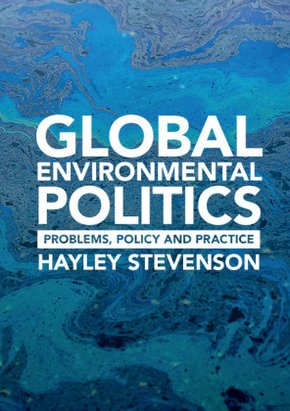
Global Environmental Politics - Problems, Policy and Practice
| Verlag | Cambridge University Press |
| Auflage | 2017 |
| Seiten | 366 |
| Format | 17,4 x 24,8 x 1,3 cm |
| Gewicht | 732 g |
| Artikeltyp | Englisches Buch |
| ISBN-10 | 1107547539 |
| EAN | 9781107547537 |
| Bestell-Nr | 10754753UA |
This introduction to global environmental politics examines why environmental challenges occur and how we can effectively respond to them.
Concern about humanity's impact on the planet has never been greater, but what are the drivers of environmental change? This wide-ranging introductory textbook outlines the competing explanations of why environmental problems occur and examines the different political approaches taken to address them. Adopting a case study approach, Hayley Stevenson enables students to gain a detailed understanding of how theories and concepts are applied in practice. Diverse perspectives on a variety of contemporary environmental challenges, from climate change to hazardous waste, as well as various responses, from multilateral diplomacy to consumer-focused campaigns, provide students with an in-depth understanding of the merits and limitations of different forms of political action. Refined on the basis of classroom feedback, features include textboxes, key points, a glossary of key terms, questions, further reading suggestions and supplementary online resources. This lively book is an essential resource for advanced undergraduate and postgraduate courses on global environmental politics and environmental policy.
Inhaltsverzeichnis:
List of acronyms; List of figures; Preface; 1. Global politics and the environment; Part I. Why Do Environmental Problems Occur?: 2. The tragedy of the commons; 3. Population and poverty; 4. Capitalism; Part II. Responding to Global Environmental Problems: 5. Conflict and securitisation - water; 6. Multilateral diplomacy - sustainable development; 7. Transnational governance experiments - climate change; 8. Aid and finance - deforestation; 9. Individualising responsibility - unsustainable consumption; 10. Problem displacement - hazardous substances; 11. Resistance and localisation - unsustainable agriculture; 12. Appraising global environmental governance; Bibliography; Index.
Rezension:
'What a wonderful book! Her book is rare for textbooks in the field in insisting on starting with the question of why environmental degradation occurs, and that this is a political question. This gives admirable focus to the volume that then covers the topics that are taught in courses on Global Environmental Politics (GEP) with great clarity. Students who are blessed to have Hayley Stevenson's book as their introduction to GEP will come away enriched and with a clarity of understanding that is hard to match.' Matthew Paterson, University of Manchester
